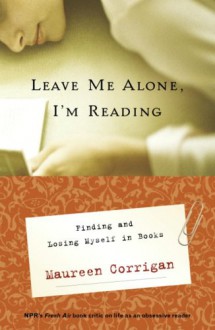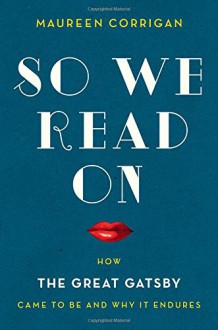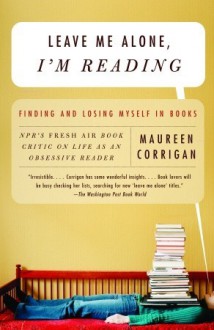
As book reviewer for NPR’s "Fresh Air" and contributor to many publications, Maureen Corrigan literally reads for a living. For as long as she can remember, books have been at the center of her life, a never-failing source of astonishment, hard truths, new horizons, and welcome companionship. Now Corrigan has added a volume of her own to the shelf of classics, by reading her life of reading with all the attention to complexity, wit, and intelligence that any good book–or life–deserves. Part memoir, part coming-of-age story, and part reflection on favorite and influential books, Leave Me Alone, I’m Reading views the world through an open book. From her unpretentious girlhood in the working-class neighborhood of Sunnyside, Queens, to her bemused years in an Ivy League Ph.D. program, from the whirl of falling in love and marrying (a fellow bookworm, of course), to the ordeal of adopting a baby overseas, Corrigan has always had a book at her side. Moving from page to life and back again, Corrigan writes ultimately of fashioning a complicated, sometimes contradictory self out of her class background, her classroom teaching, and her own classics of literature; a list of favorite books is also included. In Leave Me Alone, I’m Reading, Maureen Corrigan invites us to accompany her on the journey of a lifetime.
Amazon.com
Corrigan is an Edgar Award winning book critic / reviewer who, along with being a book reviewer on NPR's "Fresh Air" segment, also teaches literature at Georgetown University. This short memoir chronicles different pivotal moments in her life -- childhood; college experiences; trying to heal from the death of her beloved father; infertility struggles & becoming an adoptive mother -- and how her reading life tied into those moments. For readers who have an interest in infertility or adoption stories, Corrigan does go over reading recommendations just on this topic that she enjoyed.
Regarding her sharing how she got the NPR job, I thought it was pretty funny that she was initially turned down for the position because NPR told her she seemed too academic. TOO academic. For NPR. LOL.

From what I've seen with online reviews, the general consensus for this memoir seems to be mixed. I can't speak for others, obviously, but being a book blogger / vlogger myself, I really enjoyed Corrigan's stories for the most part. I'd say the one thing I struggled with were the sections where some of the books she discussed seemed pretty obscure to me (though she kept referencing them as bestsellers). Also, her favorites in genres are closer to my least favorite. Can't blame that on the author though! She's writing about her experiences and preferences, not mine. The section that aggravated me the most was when she was discussing the Catholic memoir duology Karen and With Love, From Karen by Marie Killilea. While mildly interesting at first, Corrigan goes on to talk about this set of books for 30+ pages! I have to admit, it's a little difficult to maintain interest for that many pages about books I've never heard of and, by Corrigan's description of them, didn't sound like my kind of read. Aside from that, there was a lot in this memoir that I did enjoy. I especially loved what she had to say in the Introduction essay, where she talks about what makes reading and books so special and what leads some of us to have such an obsession for the written word.
Distraction, sure. but essential nourishment for the mind and soul as well. Books are always necessary cargo. So many of us reach for them, irrationally, even in potentially dangerous situations that threaten to wreck our ability to concentrate... Such is the power of words, of writing, of books. Words can summon up a skyline from the dark; they can bring back the people you loved and will always yearn for. They can inspire you with possibilities you otherwise would never have imagined; they can fill your head with misleading fantasies. They can give you back your seemingly seamless past and place it right along your chaotic present.
"But that only happens in books," my mother, pretty much immune to the power of the written word, would say.
Exactly. That's why I can't stop reading them.
Corrigan also provides a pages-long list of reading recommendations, helpfully sorted by genre. I would recommend taking a look through those titles because it seemed like some of those listed in the back of the book were not ones she mentioned within the actual memoir. Might be worth a look-over to see if anything stirs your curiosity.
----------------------------
Note To Readers: It's not uncommon for reading memoirs / "books about books" type titles to inevitably included spoilers for other books. Some are not too bad on this front but Corrigan got especially spoiler-heavy with her story. So, consider this a spoiler alert for the following titles -- Corrigan gives away either the endings or major plot twists / reveals of: The Maltese Falcon and the short story "The Gutting Of Couffignal" both by Dashiell Hammett, Black and Blue by Anna Quindlen, Pride and Prejudice by Jane Austen, Jane Eyre and Villette (both) by Charlotte Bronte, Lucky Jim by Kingsley Amis, The Big Sleep by Raymond Chandler, Gaudy Night by Dorothy Sayers, and The Hound of the Baskervilles by Sir Arthur Conan Doyle.

 Log in with Facebook
Log in with Facebook 







